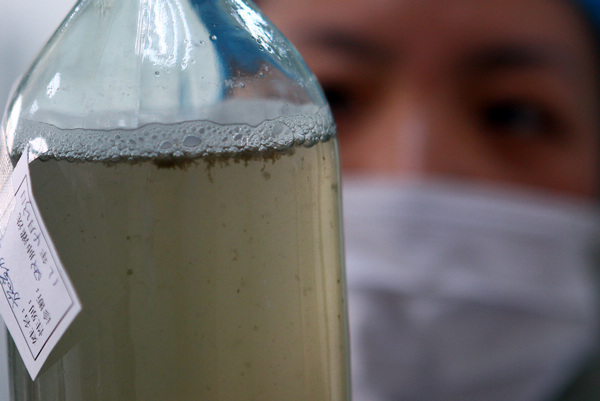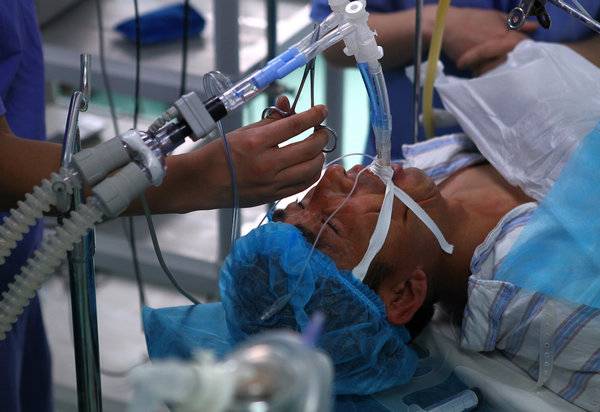Miners get help in fight against disease
By He Na (China Daily) Updated: 2012-04-25 07:59The procedure
Although the doctor ordered Ma to rest before the operation, he was too excited to sleep, "I've been longing for the operation for six years, I really want to see what's in my lungs," he said.
A cupboard in front of the operating room was packed with bottles containing different colored fluids, all drainage samples. The doctors don't need to read the labels, the color of the fluid means they can easily assess a patient's work environment.
 |
|
A bottle containing fluid drained from Ma's lungs. There are now 2.65 million people working in China's coal mines and about 57,000 contract black lung disease every year. Zou Hong / China Daily |
Ma's operation began at 8 am and the only sound in the operating room was that of a nurse pouring saline solution into a transfusion bottle. On one side of the table, 12,000 milliliters of saline flowed through a catheter into one of Ma's lungs. On the other side, a grayish-brown fluid drained slowly through a tube. Eventually, the muddy fluid filled 24 glass bottles, each with a capacity of 500ml.
Meanwhile, Huang Zongbin, 47, was busy packing for his departure. "The feeling of breathing easily is really good. I feel as though a heavy stone that had long been lying on my chest has been removed," he grinned.
Huang is a migrant worker from a village in Shannxi province and has worked in a large private gold mine since 1995. He was unlucky to contract black lung disease, because he mines gold not coal. However, he's lucky when compared with workers in other private mines who are mostly unable to claim compensation or injury insurance, because his employer agreed to pay some of the 10,000 yuan fee for his treatment.
Compensation battle
Seeking maximum profits, private mine owners are reluctant to pay for improvements in working conditions or provide health checks for workers. "When we drilled holes, dust filled the tunnel. Even people standing almost face-to-face could not see each other. The dust mingles with the air, which you have to inhale, of course, or you can't breathe," said Yang Yaoming, who worked at a private coal mine in Beijing from 1998 to 2010. "We did not wear masks when working. No one told us to do so and we lacked the knowledge to protect ourselves," he said.
 |
|
Ma Weishan undergoing the lung-lavage procedure at the Black Lung Disease Rehabilitation Center in Beidaihe, Hebei province. [Photo/China Daily] |
"I've worked on some cases involving patients with black lung disease and found that they have huge difficulty protecting their rights," said Han Shichun, a senior labor arbitration lawyer at the Beijing Yilian Labor Law Aid and Research Center.
According to the law on the Prevention and Control of Occupational Diseases, a patient applying for work-injury insurance from an employer must first obtain proof that the illness was contracted during his period of employment, then he must obtain a diagnosis from the occupational disease diagnosis institute of the labor authorities.
"However, many patients have died without receiving compensation and the owners of private mines often disappear or have found various excuses to refuse to pay compensation," said Han. "It is urgent that we educate workers in the law and provide relevant knowledge to improve their legal awareness and protect their rights. Also, we must make the penalties for violations much harsher, especially in private mines," said Han.
- Chinese needs 98,000 new pilots in next 20 years
- 88 nailed in China's int'l manhunt for fugitives
- China approves plan to combat climate change
- Planner defends new island airport off Dalian
- Shaolin Temple sues govt for delayed ticket earnings
- Model filial son kept double
life a secret - Netizens rally to wish Li Na the best
- Admiral: US flights should stop
- Security risks found in half of China's govt websites
- China marks anniversary of Japanese intrusion







